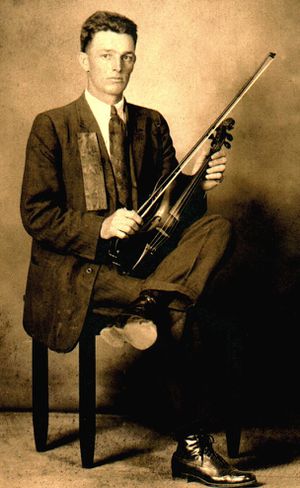Annotation:East Tennessee Blues: Difference between revisions
No edit summary |
No edit summary |
||
| Line 3: | Line 3: | ||
<p><font face="garamond, serif" size="4"> | <p><font face="garamond, serif" size="4"> | ||
'''EAST TENNESSEE BLUES'''. AKA and see "[[Hey Mr. Muskrat]]," "[[Honeysuckle]]," "[[Honeysuckle Rag]]," "[[Huckleberry Blues]]," "[[Poca River Blues]]." Old-Time, Bluegrass; Country Rag. USA, Va. C Major. Standard tuning (fiddle). One part (Christeson): AB (Beisswenger & McCann]: AA'BB' (Brody, Krassen, Phillips, Silberberg). The tune is credited (by biographer Bob Cox) to Tennessee fiddler Charlie Bowman (1889-1962), who is said to have composed it in the 1920's. Bowman, according to Cox, had not named the tune prior to recording it, and the name "East Tennessee Blues" was suggested by fiddler and bandleader Al Hopkins (of Al Hopkins and His Buckle Busters, featuring Bowman on fiddle). Having the word "Blues" in the title was not entirely satisfactory to Bowman, as it was not a blues progression, however, there were several other so-called 'blues' tunes recorded that were country rags as well. | '''EAST TENNESSEE BLUES'''. AKA and see "[[Hey Mr. Muskrat]]," "[[Honeysuckle]]," "[[Honeysuckle Rag]]," "[[Huckleberry Blues]]," "[[Poca River Blues]]." Old-Time, Bluegrass; Country Rag. USA, Va. C Major. Standard tuning (fiddle). One part (Christeson): AB (Beisswenger & McCann]: AA'BB' (Brody, Krassen, Phillips, Silberberg). The tune is credited (by biographer Bob Cox) to Tennessee fiddler Charlie Bowman (1889-1962), who is said to have composed it in the 1920's. Bowman, according to Cox, had not named the tune prior to recording it, and the name "East Tennessee Blues" was suggested by fiddler and bandleader Al Hopkins (of Al Hopkins and His Buckle Busters, featuring Bowman on fiddle). Having the word "Blues" in the title was not entirely satisfactory to Bowman, as it was not a blues progression, however, there were several other so-called 'blues' tunes recorded that were country rags as well. | ||
[[File:bowman.jpg| | [[File:bowman.jpg|300px|thumb|left|Charlie Bowman]] | ||
Another early recording was by Elmer Bird, with A.J. Ball on fiddle, and West Virginia fiddler Reese Jarvis recoded it for Brunswick Records in Chicago in 1929 as "[[Poca River Blues]]." Texas fiddler and bandleader Bob Wills recorded the tune in 1936. Bluegrass fiddlers sometime go to second position on the violin to play g/e and c/a double stops in the second part of the tune. "Honeysuckle," or "[[Honeysuckle Rag]]" is a related melody. | Another early recording was by Elmer Bird, with A.J. Ball on fiddle, and West Virginia fiddler Reese Jarvis recoded it for Brunswick Records in Chicago in 1929 as "[[Poca River Blues]]." Texas fiddler and bandleader Bob Wills recorded the tune in 1936. Bluegrass fiddlers sometime go to second position on the violin to play g/e and c/a double stops in the second part of the tune. "Honeysuckle," or "[[Honeysuckle Rag]]" is a related melody. | ||
<br> | <br> | ||
Revision as of 20:31, 19 May 2017
Back to East Tennessee Blues
EAST TENNESSEE BLUES. AKA and see "Hey Mr. Muskrat," "Honeysuckle," "Honeysuckle Rag," "Huckleberry Blues," "Poca River Blues." Old-Time, Bluegrass; Country Rag. USA, Va. C Major. Standard tuning (fiddle). One part (Christeson): AB (Beisswenger & McCann]: AA'BB' (Brody, Krassen, Phillips, Silberberg). The tune is credited (by biographer Bob Cox) to Tennessee fiddler Charlie Bowman (1889-1962), who is said to have composed it in the 1920's. Bowman, according to Cox, had not named the tune prior to recording it, and the name "East Tennessee Blues" was suggested by fiddler and bandleader Al Hopkins (of Al Hopkins and His Buckle Busters, featuring Bowman on fiddle). Having the word "Blues" in the title was not entirely satisfactory to Bowman, as it was not a blues progression, however, there were several other so-called 'blues' tunes recorded that were country rags as well.

Another early recording was by Elmer Bird, with A.J. Ball on fiddle, and West Virginia fiddler Reese Jarvis recoded it for Brunswick Records in Chicago in 1929 as "Poca River Blues." Texas fiddler and bandleader Bob Wills recorded the tune in 1936. Bluegrass fiddlers sometime go to second position on the violin to play g/e and c/a double stops in the second part of the tune. "Honeysuckle," or "Honeysuckle Rag" is a related melody.
Source for notated version: Aubery Smith (Arlington, Va.) [Christeson]; Bobby Hicks [Brody]; Charlie Higgins (Galax, Va) [Krassen]; Stephanie Prausnitz [Silberberg]; Lacey Hartje (b. 1926, Joplin, Mo.) [Beisswenger & McCann]; Charlie Bowman [Milliner & Koken].
Printed sources: Beisswenger & McCann (Ozarks Fiddle Music), 2008; p. 49. Brody (Fiddler's Fakebook), 1983; p. 98. R.P. Christeson (Old Time Fiddler's Repertory, vol. 2), 1984; p. 113. Krassen (Appalachian Fiddle), 1973; p. 75. Milliner & Koken (Milliner-Koken Collection of American Fiddle Tunes), 2011; p. 184. Phillips (Traditional American Fiddle Tunes), vol. 2, 1995; p. 46. Silberberg (Tunes I Learned at Tractor Tavern), 2002; p. 42.
Recorded sources: Alcazar Dance Series ALC 202, Sandy Bradley - "Potluck and Dance Tonite!" (1979). Brunswick 103 (78 RPM), Al Hopkins & His Buckle Busters (1927, with fiddler Charlie Bowman). County Records, Camp Creek Boys (Kyle Creed et al). County 772, Bobby Hicks- "Texas Crapshooter." Document 8039, "The Hill Billies/Al Hopkins and His Buckle Busters: Complete Recorded Works in Chronological Order, vol. 1" (reissue). Fiddler FRLP001, Tom Doucet (Nova Scotia/eastern Mass.) - "The Down East Star." Flying Fish FF-247, "Fiddle Fever" (1981). Folkways, "Old Time Music at Clarence Ashley's." Folkways FA 2475, "Old Reliable String Band." Living Folk LFR-104, Allan Block- "Alive and Well and Fiddling." Mag 1018, Ted Powers- "Old Time Fiddler." Rounder CD0262 Mike Seeger - "Fresh Oldtime String Band Music" (1988). Vocalion 5016 (78 RPM), Charlie Bowman with the Hill Billies. Voyager 301, Jim Widner- "Fiddle Jam Session."
See also listing at:
Jane Keefer's Folk Music Index: An Index to Recorded Sources [1]
Hear Charlie Bowman's recording at Slippery Hill [2]
